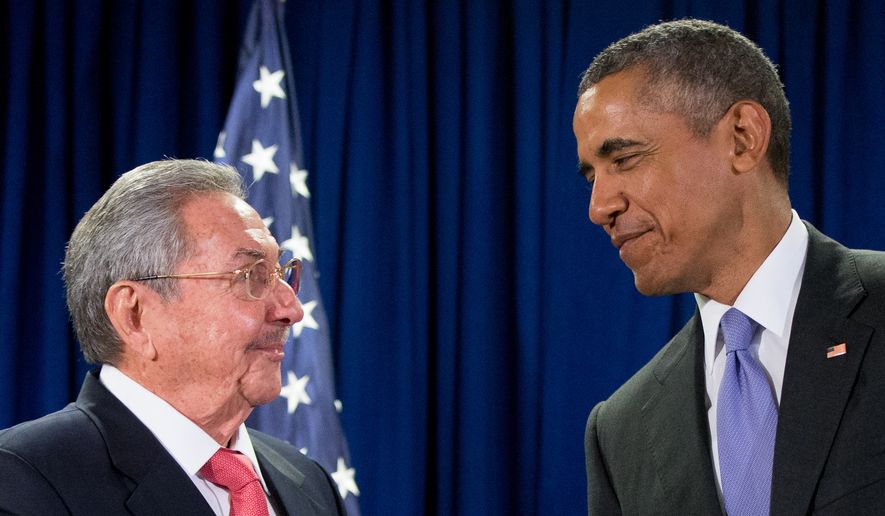The Obama administration announced the additional easing of travel and export sanctions on Cuba Tuesday as part of President Obama’s effort to normalize diplomatic relations with Havana.
The latest actions, which will take effect Wednesday, include a broadening of authorized travel, the lifting of financing restrictions on most exports, and the authorization of more export licenses for items such as software, telecommunications products and civil aviation. Treasury Secretary Jacob Lew said these new measures “send a clear message to the world: the United States is committed to empowering and enabling economic advancements for the Cuban people.”
“We have been working to enable the free flow of information between Cubans and Americans and will continue to take the steps necessary to help the Cuban people achieve the political and economic freedom that they deserve,” Mr. Lew said.
Senior administration officials said the regulatory changes will make it easier for people in the U.S. to travel to Cuba and do business with Cuban companies. For example, the administration is lifting its requirement for Cuban firms to pay cash in advance for business transactions.
Despite the new steps, the U.S. law banning travel to Cuba for tourism remains in place.
The new regulations will allow U.S. banks to provide direct financing for exports other than agricultural commodities, which are subject to the long-standing trade embargo. The regulations were jointly released by the Treasury Department’s office of Foreign Assets Control and the Commerce Department’s Bureau of Industry and Security.
A nonpartisan group promoting human rights in Cuba said the new regulations violate U.S. law and won’t help ordinary Cubans.
“This latest round of regulatory changes expressly contradicts the stated purpose of Obama’s policy, which was purportedly to ’empower the Cuban people’ and ’promote economic independence’,” said Mauricio Claver-Carone, executive Director of Cuba Democracy Advocates in Washington. “Instead, today’s regulations succumb to the Castro regime’s insistence that all foreign trade transactions must be funneled through its monopolies.”
Rather than pressuring the Castro regime to promote entrepreneurship, he said, “the Obama administration is now blatantly ’empowering’ the Castro regime’s economic grip.”
Pedro Freyre, a lawyer who specializes in Cuba-related matters, said the changes will meet the needs of the Cuban people.
“The impact of today’s announcement will truly be felt by the citizens of Cuba and will substantially enhance the abilities of US entities to engage in travel and commercial relationships with Cuba,” Mr. Freyre said in a statement.
Mr. Obama announced his plan to restore diplomatic relations with Cuba in December 2014, despite ongoing concerns about the communist regime’s poor human-rights record. Secretary of State John F. Kerry last year removed Cuba from the U.S. list of state sponsors of terrorism, a move demanded by Cuban President Raul Castro.
Both nations reopened their respective embassies last year.
Commerce Secretary Penny Pritzker said the easing of restrictions will allow greater exports for purposes such as disaster preparedness, education, agricultural production, food processing, and public transportation.
• Dave Boyer can be reached at dboyer@washingtontimes.com.




Please read our comment policy before commenting.